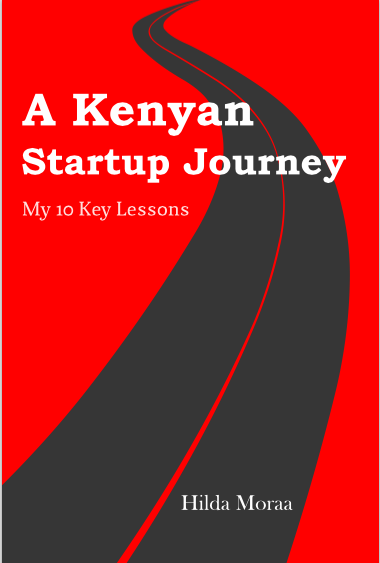
It was a tough journey I must say, though there were moments of joy too, and all that contributed to what we learnt as a team throughout the startup journey. I therefore feel it is important to share these key lessons with the rest of the startups in Kenya and across Africa and in turn build a better ecosystem. Hilda Moraa
Weza Tele is arguably the most successful startup in the Kenyan tech ecosystem. Founded in 2011 by Hilda Moraa, Sam Kitonyi and Newton Kitonga, the startup was incubated at Nailab for 6 months after which it set out on its own and was later acquired by AFB in 2015 for USD 1.7 Million. Like any other startup founder, Hilda Moraa had a dream which she had to toil and moil to bring to fruition. In her book “A Kenyan Startup Journey: My 10 Key Lessons,” she highlights some of the fundamental lessons from her journey of running Weza Tele and hopes that the same will impact other startups in Kenya and Africa.
First, she emphasizes the importance of setting up the business with proper legal structures rather than focusing too much on product development while neglecting the legal aspects of starting a company. In this regard she recognizes that most startup founders have no knowledge or experience in running companies hence tend to overlook the structure of the startup for various reasons including the expenses involved in obtaining the services of a lawyer and the general feeling that proper structures can be built later when the business picks up. She recalls a time when she gave free shares to her friends as motivation when the company could not afford to pay salaries and the process she underwent to have the shares transferred to the company. The key lesson here is “a Journey of a thousand miles begins with one step: start right.”
Second, she highlights the need for startups to separate their emotions from the business and know when to let go when the time to do so is nigh. For this lesson, emphasis is on products and services that the startup is so passionate about but that are not doing very well in the market. From her own experience of running the e-commerce platform- Myorder, Hilda advises that it is best that startups research and measure the performance of their products and services, learning to let go when the performance is on a continuous decline.
Third, she accentuates the importance of building a team culture in the startup. For Hilda, a dedicated, committed and motivated team is the key strategy to the success of a startup.
Fourth, Hilda points out the role of mentorship in giving strategic direction to the startup. Weza Tele’s greatest friend was its mentor, Joe Mucheru, now CS for the Ministry of ICT, who understood the distribution business and believed in them. For Hilda, these are the key factors to look for in a mentor: one who has diverse experience, understands the business and believes in you.
The fifth lesson relates to the leadership of the startup. Recognizing that in most instances CEOs of startups do not have leadership experience, Hilda points out what worked for her- acknowledging mistakes and learning from them, humility and following in the footsteps of her role model, Margaret Thatcher.
Sixth, she points out that entrepreneurs should learn to say no to business opportunities when the capacity to deliver is lacking. All too often, startups take on opportunities as they are available without considering team capacity and the effects that overworking poses to work and product quality. The lesson here is that startups should evaluate opportunities and learn to prioritize them together as a team based on the startup’s defined criteria and goals.
The seventh lesson relates to the very sensitive issue of funding. She advises startups not to get just any investor but one who understands the business goals, adds value by allowing the startup to take advantage of his/her brand to attract opportunities, offers mentorship and is open to other investors supporting the startup- it must always be more than the money. Once again, Hilda emphasizes that startups need to further their knowledge on shareholding structure as they negotiate to avoid giving away too much equity. She also advises startups to have a clear structure of how they will use any funds because in the end, investors will want a return on their investment.
In lesson eight, she reminds startups that it is okay to fail. She recounts her experience running Myorder, a product that failed despite having seed money and a great team of developers. For her, failure is just part of the journey and it is best to embrace it and learn from the mistakes. Nonetheless, in lesson nine, she advises techies not to give up on their startup dream before exhausting everything to make it work.
The last tip is that startups should ‘begin with the end in mind’ i.e. plan the exit strategy at the beginning. She explains that this will help the startup define its success, be able to measure it and keep track of its goals.
Overall, the book is a masterpiece for any person keen on starting the startup journey. It is about 70 pages long, filled with pictures and graphics, hence friendly to techies and other interested persons. Most importantly, it begins to tell the real success stories of startups in the Kenyan tech ecosystem. It is our hope that more startups will follow suit.